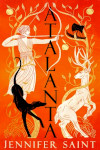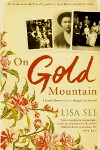Helene Wecker – The Golem And The Jinni
Posted 27th June 2014
Category: Reviews Genres: 2010s, Angst, Domestic, Fantasy, Historical, Social
9 Comments

In Britain, the book is changed from ‘jinni’ to ‘djnni’, but as ‘jinni’ is more well-known and I can think of no good reason for what is so minor a change, I will be using ‘jinni’.
Who needs Aladdin?
Publisher: Blue Door (HarperCollins)
Pages: 484
Type: Fiction
Age: Adult
ISBN: 978-0-007-48017-3
First Published: 1st April 2013
Date Reviewed: 25th June 2014
Rating: 5/5
In the 1890s, Chava is created with spells and awoken on a ship bound for New York. But when her master dies she is alone and the intelligence and curiosity that were instilled in her come to the surface in ways not intended. She is found by a Rabbi who takes her in and gets her a job at a bakery. Across the city a tinsmith cleans his neighbour’s flask and awakens a jinni who has been confined to human form; from a choice of names the jinni picks Ahmad as he can no longer say his own name. Both golem and jinni must find their way, alone, and possibly with each other.
The Golem And The Jinni is a fine historical fantasy about freedom and acceptance, wrapped in delicious writing with a few notes on racial tolerance. It is one of those rare works you can truly get lost in. It’s not epic in the adventure or time-span stakes, but the term applies all the same.
Wecker’s command of language is what you would expect of an established author. The Golem And The Jinni doesn’t feel like a début, even if you could of course suggest that some of its finesse is owing to the editor. It’s hard to point to something in the specifics; it’s the entire package that is special.
The book is technically historical fantasy, more than technically, but in many ways it is more the plain historical. Chava and Ahmad are of course fantastical characters and no doubt Wecker had a great time creating them, but nevertheless their reason for being, as such, does seem to be more about the difference they can provide, the obvious contrast to the rest of the world that a simple human-only story could not. Yes, it’s possible that the characters could have been substituted with humans, but in that case the themes would not have been so successful in what they were employed to show. In a way it’s the fantastical itself that ‘makes’ the themes – the fantasy adds to the setting and language, and illustrates in a unique way the issue of freedom, of agency.
In creating a golem, Wecker can look at social mobility, individual agency, and women’s issues of the time, far better than she could have with even the most fearless of 19th century human women. Somewhere along the line a woman would have been caught up short, or heckled, derided, unless Wecker wished to make a crime novel heroine, and using a golem bypasses that problem. Of course Chava is still restricted, but it’s more a case of wanting to fit in, of having to fit in, and as she moves away from that notion so can Wecker look at things in more detail.
This isn’t to say that the lives of the period’s women is the biggest theme, because Chava, as a golem, is somewhat exempt. But it is part of the larger theme of freedom and creating your own life and destiny. Ahmad was trapped, and remains so – he longs to be free. Chava’s never known any different, but as he teaches her, you see her flourish, ironically flourishing in a role that is the antithesis of the one she is supposed to be living. In this way, Wecker also explores the concept of choice and what being unrestricted can do for a person. Furthermore, both represent constraints, Chava’s being invisible – society’s rules, not always relevant. Ahmad’s obvious and omnipresent – not society’s but due to society’s fear and the power that comes when someone exploits that fear. The golem and jinni balance each other out.
We see the lack of freedom in Sophia, a human who meets the jinni. Sophia shows us the more ‘human’ (as much as he can be) side of Ahmad, but she also provides a contrast to Chava, being a woman who wants to define her own life but is unable to, versus Chava’s reservations but ultimate prime position. The character is one of a few that illustrate the restrictions society placed on women, and the way they were treated.
There is a little of race and emigration, too, though this is in the background for the most part. That said, Chava and Ahmad’s actions explore the positives to be gained from connecting with others from outside our own cultural spheres.
It should be noted that the book isn’t solely about the mythical, that there are sections about various people, and the humans are given just as much space. These people are those particularly affected by the golem and jinni in some way – a lover, a past acquaintance, a person affected by an issue falling in the fantastical realm of the otherwise factual world. These sections allow us to observe the period and cultural relations. They allow you to witness the stark differences in fortune, placement, and sometimes, luck.
Whether or not you work out the twists shouldn’t affect your enjoyment. Talking of twists, however, the ending is very well plotted. All questions are answered, in a particularly intriguing way. They are answered simply and quickly (this is the end, after all) yet there remains a subtlety to them, something that enables them to be revealed clearly, yet in a way that doesn’t get you racing to finish the book. It’s a slow burner and you are meant to be able to enjoy each answer before moving on.
The Golem And The Jinni is, simply, a magnificent book. Beautifully written, magical both in character and temperament, and a tale that is fairly long already but one which you’ll wish was even more so, it has a lot to offer. And it keeps on giving, even though the jinni would prefer it not to.
Related Books
June 27, 2014, 12:38 pm
I listened to the audio edition and it was wonderful! I think George Guidall was the narrator. I would have loved the book in print, too, I think, but it was great on audio. I always saw “jinni” spelled as “genie” in the US, but “jinni” or “djinni” seems more exotic!
June 27, 2014, 1:47 pm
You’re so right–I loved the push and pull of the two characters with freedom and bondage, clay and fire.
It’s a well-plotted and fast-paced book, isn’t it?
June 29, 2014, 4:05 am
I have a copy of this one and really want to read it. It sounds awesome.
June 29, 2014, 2:52 pm
A lovely review, this one sounds fascinating, love when a writer brings in the supernatural and does it well.
June 29, 2014, 7:11 pm
I have heard only good things about this book I would really like to read it.
Christine @Buckling Bookshelves
July 1, 2014, 3:46 pm
I can’t wait to read this one! I pre-ordered it last summer when it first came out and can’t believe it’s been languishing on my shelf — I really must read it soon & glad to hear how much you enjoyed it :)
July 7, 2014, 12:11 pm
Aarti: Yes, there is quite a bit of diversity in it. I think you’d find a fair amount to comment on :)
Laurie: I suppose the exoticness would match people’s views at the time. Good to hear it worked as an audiobook.
Jeanne: Clay and fire, that’s something I didn’t think of (and which I feel silly about now as it’s so obvious!) It is, I agree with both :)
Blodeuedd: Good to hear :)
Literary Feline: It is. It’s the first book in… ever… that I’ve not checked the page count and actively decided I wouldn’t.
Jennifer: Yes, it’s pretty perfect really. A good blend, well-written, etc.
Jessica: I think it’s a winner for most people. It’s definitely fantasy/literary fiction.
Christine: That situation sounds too familiar ;) You’ve bought a very good book :)
9 Comments
Comments closed


























June 27, 2014, 2:36 am
I have this on my wish list but I was not really prioritizing it. This review pushed it closer to the top! Didn’t realize it had such a diverse set of characters,